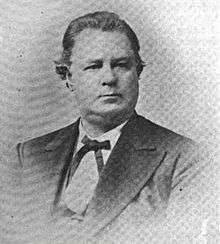Jefferson P. Kidder
| Jefferson P. Kidder | |
|---|---|
 | |
| Member of the U.S. House of Representatives from Dakota Territory's at-large district | |
|
In office March 4, 1875 – March 3, 1879 | |
| Preceded by | Moses K. Armstrong |
| Succeeded by | Granville G. Bennett |
| 18th Lieutenant Governor of Vermont | |
|
In office October 1853 – October 13, 1854 | |
| Governor | John S. Robinson |
| Preceded by | William C. Kittredge |
| Succeeded by | Ryland Fletcher |
| Member of the Minnesota House of Representatives | |
|
In office 1859 1863 | |
| Member of the Vermont Senate | |
|
In office 1847–1849 | |
| Personal details | |
| Born |
June 4, 1815 Braintree, Vermont |
| Died |
October 2, 1883 (aged 68) St. Paul, Minnesota |
| Political party | Republican |
Jefferson Parish Kidder (June 4, 1815 – October 2, 1883) was an American lawyer and jurist. He served as the non-voting delegate from the Dakota Territory to the United States House of Representatives.
Early life
Kidder was born in Braintree, Vermont on June 4, 1815. He attended the Orange County Grammar School in Randolph, and graduated from Alden Partridge's American Literary, Scientific and Military Academy (Norwich University) in 1834.[1] He studied law in Montpelier, was admitted to the bar in 1839 and practiced in Braintree and West Randolph.
Career
He was a member of the Vermont Constitutional Convention in 1843. He served as State's Attorney for Orange County (1842-1847), a member of the Vermont State Senate (1847-1849), the 17th Lieutenant Governor of Vermont (1852-1853), and a delegate to the 1856 Democratic National Convention.
In 1848 he received the honorary degree of Master of Arts from the University of Vermont.
In 1857 Kidder moved to St. Paul, Minnesota, where he joined the Republican Party. He was elected to the Minnesota House of Representatives in 1859 and 1863.
In 1865 he moved to Vermillion, Dakota Territory, when Abraham Lincoln appointed him an associate justice of the territorial Supreme Court.
In 1875 he resigned from the court, having been elected the territory's delegate to the U.S. Congress. He served from March 4, 1875 to March 3, 1879. He was an unsuccessful candidate for renomination in 1878.
After leaving Congress Kidder was reappointed to the territorial Supreme Court, where he served until his death.
Death and burial
Kidder died in St. Paul on October 2, 1883. He was buried in St. Paul's Oakland Cemetery.
Family
His son Lyman Kidder was a US Cavalry 2nd lieutenant serving in the 2nd Cavalry under George Armstrong Custer, and was killed in action in what would be dubbed the Kidder massacre.
Jefferson Kidder was also the grandfather to noted lawman and Arizona Ranger Jeff Kidder.
Legacy
Kidder County, North Dakota is named for him.[2]
References
- ↑ Norwich University, 1819-1911; Her History, Her Graduates, Her Roll of Honor, Volume 2, 1911, page 682
- ↑ Gannett, Henry (1905). The Origin of Certain Place Names in the United States. Govt. Print. Off. p. 174.
External links
- United States Congress. "Jefferson P. Kidder (id: K000164)". Biographical Directory of the United States Congress.
| Political offices | ||
|---|---|---|
| Preceded by William C. Kittredge |
Lieutenant Governor of Vermont 1853–1854 |
Succeeded by Ryland Fletcher |
| United States House of Representatives | ||
| Preceded by Moses K. Armstrong |
Delegate to the U.S. House of Representatives from Dakota Territory's at-large congressional district March 4, 1875 – March 3, 1879 |
Succeeded by Granville G. Bennett |
